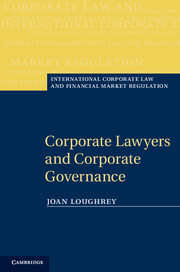Book contents
- Frontmatter
- Contents
- Preface
- Table of cases
- Table of statutes
- Table of statutory instruments
- International treaties
- List of abbreviations
- 1 Introduction
- 2 The international perspective
- 3 The roles of the corporate lawyer
- 4 Identifying the corporate client
- 5 The role of the corporate lawyer in intra-corporate litigation
- 6 The corporate lawyer as director
- 7 The regulation of the corporate lawyer
- 8 The case against reform
- 9 Reforming the role of the corporate lawyer
- 10 The reform of the legal profession and the role of the corporate lawyers
- 11 Conclusion
- Bibliography
- Index
8 - The case against reform
Published online by Cambridge University Press: 07 October 2011
- Frontmatter
- Contents
- Preface
- Table of cases
- Table of statutes
- Table of statutory instruments
- International treaties
- List of abbreviations
- 1 Introduction
- 2 The international perspective
- 3 The roles of the corporate lawyer
- 4 Identifying the corporate client
- 5 The role of the corporate lawyer in intra-corporate litigation
- 6 The corporate lawyer as director
- 7 The regulation of the corporate lawyer
- 8 The case against reform
- 9 Reforming the role of the corporate lawyer
- 10 The reform of the legal profession and the role of the corporate lawyers
- 11 Conclusion
- Bibliography
- Index
Summary
Introduction
In previous chapters various problems with the role that corporate lawyers play in companies, and the manner in which they are regulated, have been identified. It does not automatically follow, however, that reform of the role of the lawyer is desirable. This chapter analyses arguments for not taking action. These include the argument that reform is unnecessary, as the UK system of corporate governance works well enough without enhancing the lawyer's role; that insofar as there are problems with UK corporate governance, reform should be targeted at other groups; that requiring lawyers to perform a more extended corporate governance role will be unsuccessful, because lawyers will be unable to detect misfeasance due to structural constraints or cognitive bias; that imposing whistle-blowing duties on lawyers would undermine legal professional privilege and, paradoxically, undermine the corporate governance role of lawyers; and that reform would be too costly.
Change is unnecessary
The present system of corporate governance is sufficiently strong
The United Kingdom and the United States share significant similarities in the structure of their capital markets. Coffee argues that in both countries ownership and control are separated, ownership is dispersed and shareholders lack the insider information necessary to monitor management effectively. To address this information asymmetry, in both jurisdictions extensive disclosure obligations are imposed on companies. The effectiveness of such a system relies heavily on gatekeepers to monitor and verify the accuracy and quality of disclosures made by management.
- Type
- Chapter
- Information
- Corporate Lawyers and Corporate Governance , pp. 223 - 248Publisher: Cambridge University PressPrint publication year: 2011

